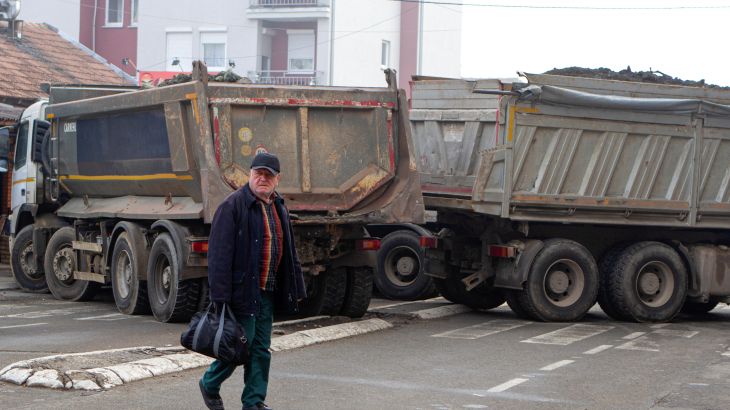Kosovo minister sees Russian influence in growing Serbian tension
Interior Minister Xhelal Svecla accused Belgrade of supporting Serbian protesters as a means to destabilise Kosovo.

Kosova’s Interior Minister Xhelal Svecla has accused Serbia, under the influence of Russia, of attempting to destabilise his country by supporting the Serb minority in northern Kosovo who have blocked roads in an escalation of weeks of protests.
Serbs in the ethnically-divided city of Mitrovica in northern Kosovo erected new barricades on Tuesday, hours after Serbia said it had put its military on the highest combat footing following weeks of escalating tensions between Belgrade and Pristina over the protests.
Keep reading
list of 4 itemsWhat is behind the violence between Serbia and Kosovo?
Serbia’s Vucic seeks NATO approval to send forces to north Kosovo
Serbia’s Pirot city declares emergency after ammonia leak
The new barriers, made of heavily-loaded trucks, were put in place overnight in Mitrovica and represent the first time since the recent crisis started that Serbs have blocked streets in one of Kosovo’s main towns. Until now, barricades had been set on roads leading to the Kosovo-Serbia border.
The trucks have been parked to block the road linking the Serb-majority part of the town to the Albanian-majority part.
“It is precisely Serbia, influenced by Russia, that has raised a state of military readiness and that is ordering the erection of new barricades, in order to justify and protect the criminal groups that terrorize,” Svecla said in a statement on Tuesday.
Serbia denies it is trying to destabilise its neighbour Kosovo and says it only wants to protect the Serbian minority living in what is now Kosovan territory but is not recognised by Belgrade.
Belgrade has placed its army and police on the highest alert, saying that the order was necessary as it believes that Kosovo is preparing to attack Serbs and forcefully remove the barricades.
Since December 10, Serbs in northern Kosovo have erected multiple roadblocks in and around Mitrovica and exchanged sporadic gunfire with Kosovo police following the arrest of a former Serb police officer working in the Kosovar force.
Ethnic Serb protesters are demanding the release of the arrested officer and have other demands. Their protests follow earlier unrest over the issue of car licence plates. Kosovo has for years wanted ethnic Serbs in the north to switch their Serbian car licence plates to those issued by Pristina as part of the government’s desire to assert authority over its territory. Serbs have refused to do so.
Approximately 50,000 Serbs live in the northern part of Kosovo and refuse to recognise the Pristina government or Kosovo as an independent state. They see Belgrade as their capital and want to keep their Serbian licence plates.
Kosovar officials have accused Serbian President Aleksandar Vucic of using Serbia’s state media to stir up trouble and trigger incidents that could act as a pretext for an armed intervention in the former Serbian province.
An academic at the Kosovar Centre for Security Studies, Skender Perteshi, accused Serbia and Russia of deliberate attempts to disrupt the region.
“The idea of Serbia and Russia together is to try to make conflicts and crisis anywhere where the West has a role and to increase this kind of instability in the region to increase the influence of Russia and Serbia in the region,” he suggested.
Kosovo’s former Foreign Minister Meliza Hardinaj also tweeted on Wednesday that the barricades in the north of the country were not spurred by a “lack of” Serbian community rights, but were “a direct order” from Serbia and Russia to ignite conflict.
The fact that #Vucic’s criminal gangs blocked their part of Merdare CCP w/ Republic of #Kosovo proves sharply that the illegally erected barricades in north🇽🇰 are not a protest for lack of #Serbian community rights but rather a direct order from #Serbia/#Russia to spark conflict!
— Meliza Haradinaj (@MelizaHaradinaj) December 28, 2022
Kosovo’s government has said that its police force has the capacity to remove the Serbia barricades, but they were waiting for NATO’s Kosovo peacekeeping force — KFOR — to respond to their request for peacekeepers to remove the barricades.
Russia’s invasion of Ukraine has led European Union states to devote more energy to improving relations with the six Balkan countries of Albania, Bosnia and Herzegovina, Kosovo, Montenegro, North Macedonia and Serbia, despite continuing reluctance to enlarge the EU further.
Albanian-majority Kosovo declared independence from Serbia in 2008 with the backing of the West in the aftermath of a 1998-1999 war in which NATO intervened to protect ethnic Albanian citizens.
Kosovo is not a member of the United Nations and five EU states — Spain, Greece, Romania, Slovakia and Cyprus — refuse to recognise Kosovo’s statehood.
Russia, Serbia’s historical ally, is also blocking Kosovo’s membership in the UN.